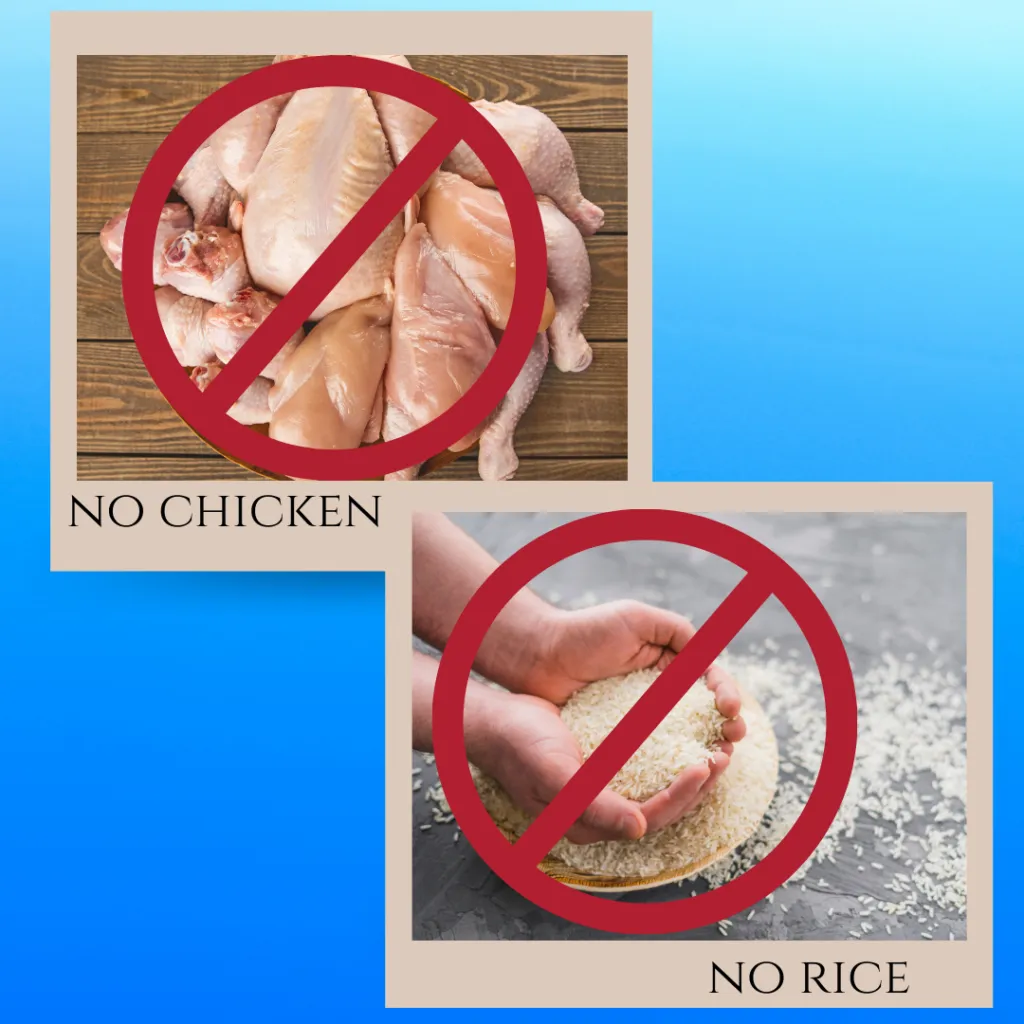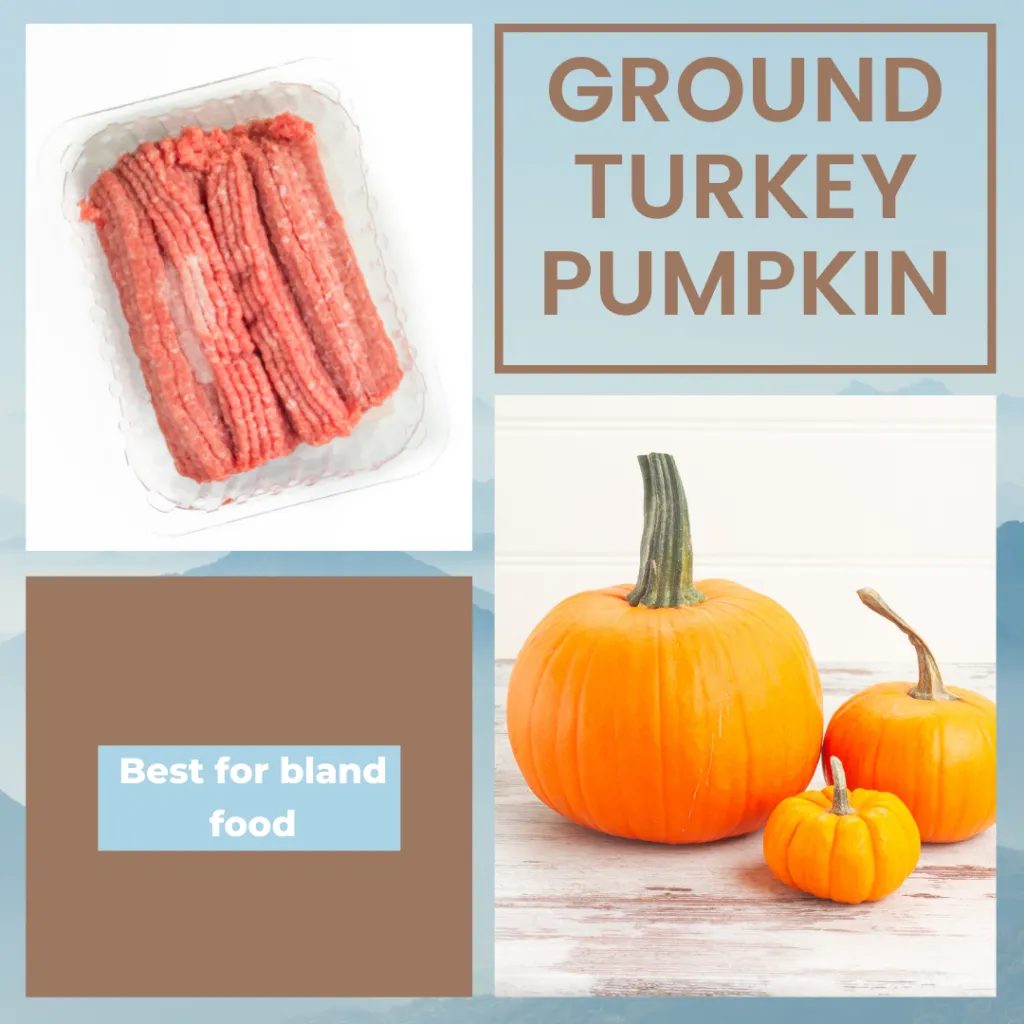For decades, boiled chicken and rice has been the default recommendation from veterinarians for dogs suffering from gastrointestinal upsets like diarrhea and vomiting. It’s often viewed as the ultimate bland diet, a comforting meal for a distressed canine. However, as an expert in canine nutrition and care, I’m here to tell you that it’s time to reconsider this long-standing advice. While well-intentioned, the traditional chicken and rice combination, often deemed “good for dogs,” might actually be hindering your dog’s recovery and potentially causing more harm than good. Let’s dive into why this popular remedy falls short and what superior alternatives you should consider for your furry friend.
The Problem with Rice in a Bland Diet
When your dog is experiencing digestive distress, the goal of a bland diet is to provide easily digestible nutrients that soothe the gut and help restore normal function. Rice is typically included in this diet as a source of carbohydrates and a supposed source of fiber. However, its benefits are often overstated and its drawbacks overlooked.
White rice, the most commonly recommended type, contains only a little over a gram of fiber per cup of cooked rice. This minimal amount is hardly sufficient to significantly benefit a “ticked off” digestive system. More critically, rice breaks down rapidly into simple sugars, which can actually promote inflammation in an already compromised digestive tract. Considering that inflammation is often a core issue in GI upset, increasing it is counterproductive. Furthermore, a growing concern is the presence of arsenic in rice. Arsenic is a toxic trace mineral that can be found in all types of rice and rice-based products, and while the amounts vary, consistent intake, especially during a period of vulnerability, is a valid concern for pet owners. If you’re looking for more general dietary information for your dog, understanding suitable foods for dogs can help you make informed choices.
 Unwell dog looking away from a bland bowl, highlighting why chicken and rice for dogs might not be ideal.
Unwell dog looking away from a bland bowl, highlighting why chicken and rice for dogs might not be ideal.
The Pitfalls of Boiled Chicken for Digestive Issues
Just like rice, chicken is often seen as a safe, lean protein for dogs with an upset stomach. While chicken can be a healthy part of a dog’s regular diet, when it comes to digestive recovery, it presents its own set of challenges. Chicken is often higher in fat than other meats, and contrary to popular belief, simply boiling it does not remove all the fat. In fact, the aggressive “overcooking” many people employ to try and render out the fat can be detrimental. Cooked fats, especially those subjected to high heat, are more likely to cause or worsen existing pancreatitis, a serious and painful inflammation of the pancreas.
Moreover, high-heat cooking of fats and proteins creates advanced glycation end products (AGEs) and advanced lipoxidation end products (ALEs). These compounds are implicated in the worsening of chronic diseases and the acceleration of the aging process. For a dog already struggling with a sensitive system, introducing these inflammatory compounds is counterproductive. While we focus on what to feed, it’s equally important to know foods dogs cannot eat to prevent further issues.
Beyond Bland: What Your Dog Truly Needs When Sick
When dogs experience diarrhea and/or vomiting, the primary concerns are dehydration, electrolyte loss, and the poor absorption of vital nutrients. Many sick dogs lose their appetite, making it crucial to offer something that not only appeals to their nauseous system but can also be effectively digested and absorbed by their compromised digestive tract. This is where the limitations of traditional chicken and rice become clear. We need ingredients that actively support healing, replace lost nutrients, and soothe irritation, rather than potentially exacerbating it. Exploring a wider range of foods for an upset stomach can be incredibly beneficial.
Superior Alternatives for Canine Digestive Health
Fortunately, there are far better options available that can genuinely support your dog’s recovery from digestive upset, moving beyond the outdated notion that chicken and rice is inherently “good for dogs.”
Pumpkin: The Fiber-Rich Gut Soother
Canned pumpkin (ensure it’s plain pumpkin, not pie filling with added spices) is a true powerhouse for canine digestive health. It boasts almost six times the fiber contained in rice! Most importantly, pumpkin is rich in soluble fiber. This type of fiber forms a gentle gel in the digestive tract, which can coat and soothe irritated tissues, helping to normalize bowel movements. It also slows stomach emptying, which is beneficial in reducing the frequency and severity of diarrhea. Beyond fiber, pumpkin is rich in potassium, a crucial electrolyte often lost in significant amounts during bouts of diarrhea or vomiting. Replenishing potassium can prevent cramping and alleviate nausea, making your dog more comfortable.
 Fresh pumpkin on a wooden table, emphasizing pumpkin's benefits for dogs with an upset stomach.
Fresh pumpkin on a wooden table, emphasizing pumpkin's benefits for dogs with an upset stomach.
Dehydrated Carrots: An Added Nutritional Boost
Dehydrated carrots, such as the Olewo brand mentioned in the original context, are another excellent addition to a bland diet. While not a replacement for pumpkin, they serve as an additional source of easily digestible nutrients and intestinal soothers. They can be particularly useful as a topper to regular kibble to enhance overall digestive health and address mild soft stools. They provide gentle fiber and vitamins without the inflammatory potential of rice. Many human food options for dogs can offer surprising health benefits when prepared correctly.
Lean Turkey: A Better Protein Choice
When it comes to protein for an upset stomach, turkey stands out as a superior choice over chicken. It is naturally lower in fat than both chicken and beef, which is critical for reducing the risk of pancreatitis and digestive irritation. Lean ground turkey (93% lean or more) is readily available in most supermarkets. It only needs to be lightly cooked, minimizing the formation of detrimental AGEs and ALEs that are common with overcooked, fatty meats. This makes it a much gentler and more beneficial protein source for a dog with a sensitive digestive system.
When to Call the Vet: Essential Guidance
While home remedies can be helpful for mild, isolated incidents, it’s crucial to know when to seek professional veterinary care. If your dog experiences more than one episode of vomiting and/or diarrhea, becomes lethargic, shows any worsening of symptoms (such as blood in stool or vomit, severe pain, or fever), or if your intuition tells you that something isn’t right, contact your veterinarian immediately. These symptoms can indicate a more serious underlying condition that requires prompt medical attention. Understanding your dog’s specific needs, including breed-specific dietary advice can also be helpful for prevention.
If your veterinarian recommends a bland diet, consider the pumpkin-turkey mixture outlined here. For a dog with diarrhea, a typical protocol involves feeding a 50% pumpkin and 50% lightly cooked lean turkey mixture in 2-3 meals per day. The total amount fed should be about 75% of the dog’s usual regular food intake. This combination provides ample soluble fiber, essential electrolytes, and easily digestible lean protein to support a swift and comfortable recovery.
Conclusion
The traditional recommendation of chicken and rice for dogs with digestive issues, while deeply ingrained, is outdated and often suboptimal. Both ingredients, particularly when prepared improperly, can introduce inflammatory elements or lack the crucial nutrients needed for effective healing. By understanding the limitations of rice and chicken and opting for superior alternatives like plain canned pumpkin and lean, lightly cooked turkey, you can provide a truly supportive and restorative diet for your dog during times of stomach upset. Always remember to consult your veterinarian for advice on persistent or severe symptoms, ensuring your beloved pet receives the best possible care.
